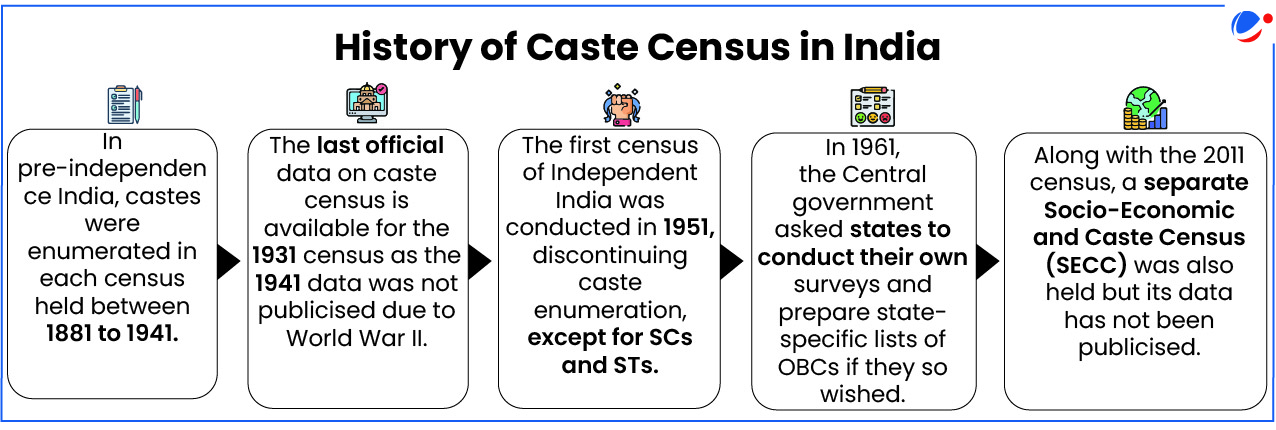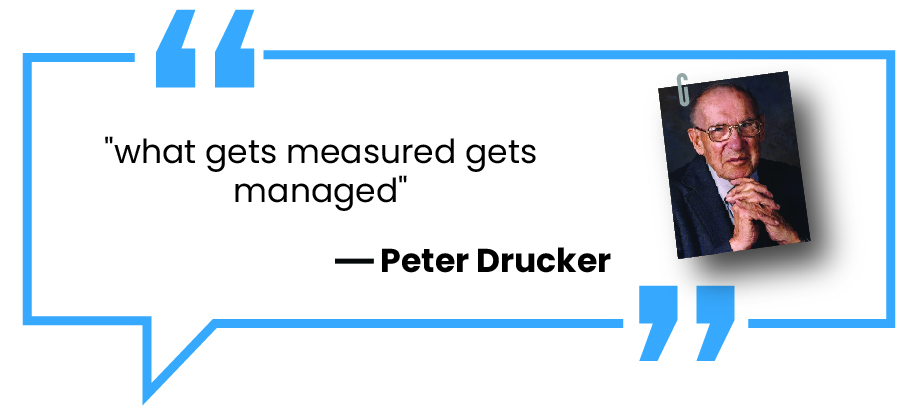Why in the News?
Centre issued notification for census which begin from October 2026 in Ladakh and March 2027 across rest of India which includes caste census.
More on the News
- First Since Independence: This marks the first time since independence that caste data (beyond Scheduled Castes and Scheduled Tribes) will be officially collected as part of the decennial census.
- Discrepancies in State-Level Caste Surveys: Several states have conducted their own caste surveys (e.g., Bihar, Karnataka, etc.) in recent years, but these have often lacked uniformity, transparency, and credibility, leading to doubts about their reliability and comparability.
- A caste survey is different from a caste census, as census is a constitutionally mandated unlike surveys.
- Digital Mode: The upcoming census will incorporate a mobile application to digitally record the census data alongside the traditional pen and paper mode.
Census in India
- About: It is a decennial exercise that provides comprehensive demographic, social, and economic data relating to all persons in the country, at a particular time.
- Censuses have been conducted regularly every ten years since 1881 in India. However, the latest census, scheduled to take place in 2021, was indefinitely put on hold due to COVID-19.
- Legal Framework
- Constitutional Provision: Census is a Union subject under Entry 69 of the Union List of the Seventh Schedule as per Article 246 of the Constitution.
- Statutory Provisions: For conduct of census, the Census Act, 1948 and the Census Rules, 1990 provide the legal framework along with the duties and responsibilities of census officers.
- The Registrar General and Census Commissioner (RG&CC) is authorized to design the census proforma, including the addition of caste-related questions without the need for amending the Act.

Need for Caste Census
- Constitutional mandate: Article 340 mandates appointing a commission to investigate socially and educationally backward classes.
- Policy Making: Accurate caste data is crucial for evidence-based policymaking, targeted welfare schemes, and equitable resource allocation.
- OBC groups argue that their claims on national resources are often neglected due to lack of updated data on their numbers and backwardness.
- Affirmative Action: It enables better identification of disadvantaged groups for reservations in education and public employment and also the better monitoring of the effectiveness such policies for necessary adjustments.
- Various rulings of the Supreme Court have held caste as a 'relevant criterion', 'sole criterion' or 'dominant criterion' for defining a backward class, and have demanded detailed caste-wise data for upholding reservation policies.
- Demands of OBC reservation by various groups across India (such as Marathas in Maharashtra, Jats in Haryana, etc.) can be better ascertained.
- Sub-categorization: Helps in the sub-categorization of OBCs and other groups to ensure equitable distribution of benefits and address intra-group disparities.
- Justice Rohini Commission on sub-categorization of OBCs, formed in 2017, is yet to present its report.
- Comprehensive National Database: A central database of all castes, enumerated with full transparency in an objective manner is necessary amidst various state level discrepancies in caste surveysfor a data driven good governance process.
Issues associated with Caste Census
- Data Accuracy and Reporting: Self-reporting of caste identities and lack of proper training of government officials can lead to errors or deliberate misrepresentation.
- E.g., 2011 SECC reported inflated caste counts due to duplicate entries and misspellings, rendering parts of the data unusable.
- Classification Issues: Variations in caste classification between Centre and state lists create inconsistencies. For instance, a caste listed as OBC in one state may be unrecognized in another (e.g., Jats in Haryana vs. Uttar Pradesh).
- Political Sensitivities: Recognition of certain castes may lead to demands for inclusion in reservation categories, stirring political unrest.
- E.g., the Gujjar agitation in Rajasthan at one point demanded ST status based on socio-economic backwardness.
- Identity Politics: Caste data may intensify caste-based political mobilization, deepening social divisions.
- Privacy Concerns: Collecting caste data digitally raises concerns about data security and privacy, especially in rural areas with limited digital literacy.
Way Forward

- Consultative Process: The Office of the Registrar General of India and the Census Commissioner must consult with academics, caste groups, political groupings and the public at large to device a method of caste enumeration accurately.
- Caste Directory: A comprehensive national directory of castes should be created in the upcoming census, standardizing the classification and nomenclature of various caste groups across states.
- The government should enlist sociological/ anthropological experts to draw up a draft list of castes specific to each State, publish the draft list online, inviting suggestions and comments from the public before finalising it, and give only that list to the enumerators.
- Training and Capacity Building: Officials and staff collecting the caste data must be properly trained to avoid duplication and spelling errors in caste enumeration.
- Modern technologies like AI and Big Data Analytics can be used to minimize errors.







